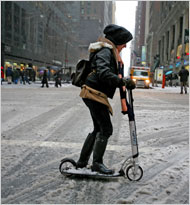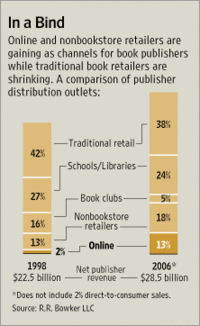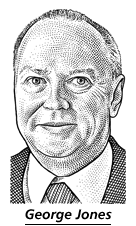Cultural history background for the young: at the beginning of every installment of the "Rowan and Martin Laugh-In" TV comedy review (circa 1968-1973), someone would sarcastically intone that the show was being broadcast from "beautiful downtown Burbank."
Excerpted below is Daniel Pink’s incredible conversation with a Burbank city clerk:
(p. 199) What led me to this 100,000-person city in California’s San Fernando Valley—past the fish fountains, to the steps of City Hall—was a rumor I’d heard that Burbank puts free agents in jail.
. . .
(p. 200) After fifteen minutes of probing, here’s the gist of what he tells me: If I want to write from a home office in Burbank, I first must apply for a home occupation license. The city would examine my application, and then come to my house to inspect the office from which I intended to work. Once the inspector deemed my home office safe for writing and unthreatening to my neighbors, I could begin earning a living, my workplace now officially blessed by the city.
But that was only the beginning. I’d have to pay a special tax. And I’d have to abide by the strictures of Burbank Municipal Code Section 31-672—which, among other things, said: My office couldn’t be larger than four hundred square feet or 20 percent of my home’s square footage. I couldn’t put my home office in a "garage, carport, or any other area required or designated for the parking of vehicles." The only "materials, equipment, and/or tools" I could use to do my work were things used by "a normal household." I couldn’t use my home office to repair cars, sell guns, or operate a kennel. And the only folks who could ever work with me in the office were people who lived with me.
That last provision alarmed me.
Pointing to Section 31-672(c), I ask, "Does this mean I can’t have a meeting at my house?"
"Yep," says the clerk. "You’d have to somewhere else."
"Let me get this straight," I say. "Let’s say I’m a writer collaborating on a screenplay. If my collaborator comes over and we work on the screenplay together, that’s against the law? It’s a misdemeanor to have a meeting at your house?"
"Yep," says the clerk.
"Isn’t California a ‘three strikes and you’re out’ state?"
"Yep."
Burbank, we we have a problem. I hope it’s unlikely that a free agent who has three meetings at her house, and gets caught, prosecuted, and convicted each time, goes to jail for the rest of her life. But the mere possibility reflects a wider problem with America’s legal, policy, and tax regimes. They were built for a (p. 201) work world that has largely disappeared, and are ill equipped for the new world that has arrived.
Source:
Pink, Daniel H. Free Agent Nation: How America’s New Independent Workers Are Transforming the Way We Live. New York: Warner Business Books, 2001.
(Note: italics in original; ellipsis added.)
 Environmentalist Michele Conlin scooters around New York during the winter. Source of photo: online version of the NYT article cited below.
Environmentalist Michele Conlin scooters around New York during the winter. Source of photo: online version of the NYT article cited below.




 Photo on left is a Borders store; image on right is of Borders CEO George Jones. Source of photo and image: online version of the WSJ article cited above.
Photo on left is a Borders store; image on right is of Borders CEO George Jones. Source of photo and image: online version of the WSJ article cited above. In response to environmental concerns, the Sandy River Dam is destroyed. Source of photo: online version of the WSJ article cited below.
In response to environmental concerns, the Sandy River Dam is destroyed. Source of photo: online version of the WSJ article cited below.